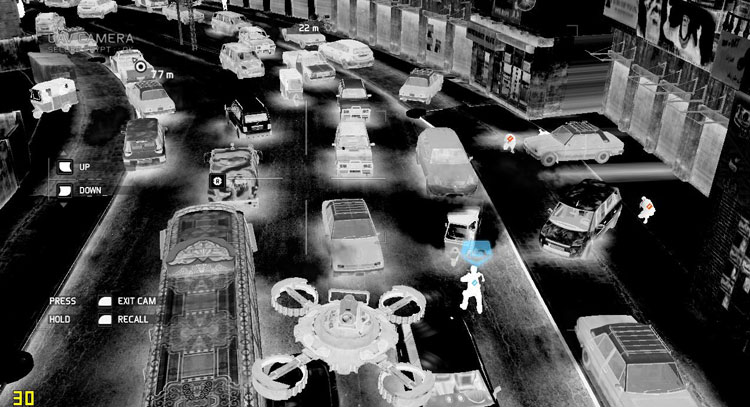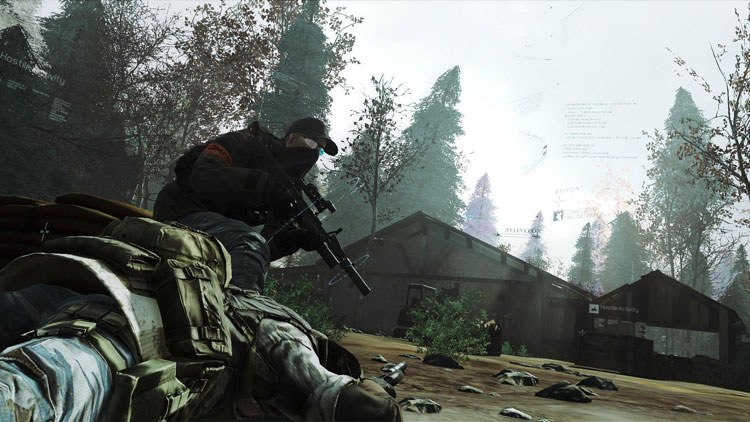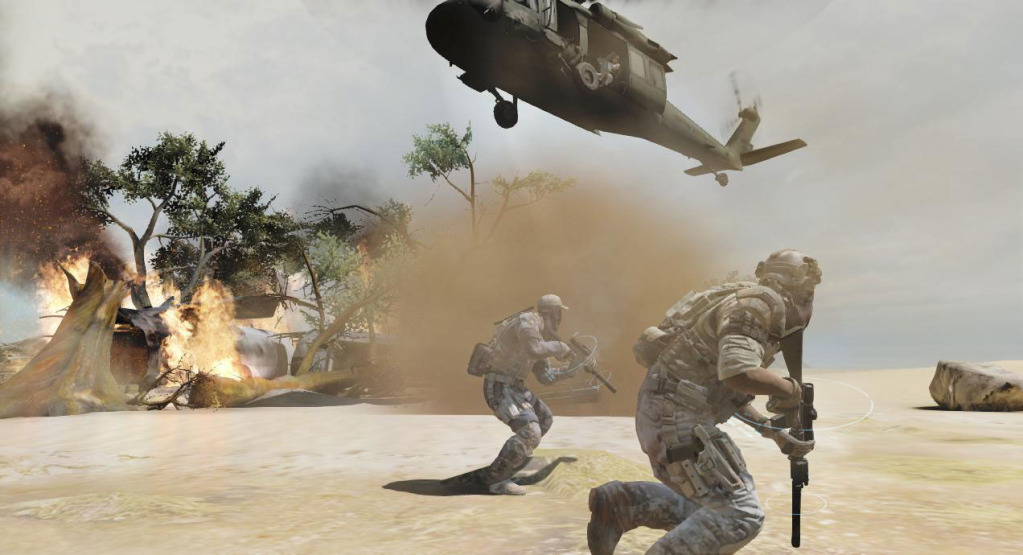This post has not been edited by the GamesBeat staff. Opinions by GamesBeat community writers do not necessarily reflect those of the staff.
Full disclosure: Ubisoft provided a free copy of Ghost Recon: Future Soldier for the purposes of this article.

Some kind of generic middle-eastern village.
The future.
A team of four highly trained soldiers, weighed down with an absurd amount of advanced technological equipment, stalks a group of terrorist thugs through a bombed-out village. After tossing out a sensor that pinpoints where all of the enemies are, one of them releases a tiny remote-controlled helicopter and uses it to set up an elaborate series of simultaneous sniper shots that kills all of the thugs in a matter of seconds.
This is Tom Clancy’s Ghost Recon: Future Soldier, and now it's time for these soldiers of the future to head home. That's where the really important stuff happens…apparently.
In theory, this is a game about shooting people. Well, sometimes you need to avoid shooting people, but the idea is that everything you do is related to shooting people. Except that it's really not, as made clear by a handful of bizarre choices the developers made. They're so bizarre, in fact, that it's not even worth talking about the actual gameplay. You shoot people in games like this all the time, but how often do you get to watch people hang out on bunk beds?
Before we go on, let’s check back in with that team of soldiers. Fresh off their first mission, they decide to kill some time in their quarters, cracking wise and doing other bro stuff that bros do. The room they stay in is the sort of generic military sleeping area you see in most games (or movies) like this: plain gray walls, a punching bag in one corner, bunk beds, and a boom box playing shitty heavy-metal music.
Three Ghost Team members are inside, testing out their new (and never-explained) invisibility technology. That is to say they’re sitting on their bunk beds cracking wise and doing other bro stuff…while invisible for no reason. The leader of Ghost Team, who is only ever referred to as “Ghost Lead,” enters the room and distributes iPads to everyone so he can explain their next mission…which he does by telling everyone to just use their iPads. OK, they’re not really iPads, but it’s easier to say that than “generic tablet computer,” and the interface they show is sort of iPad-esque.
Evidently, this scene is very important to our understanding of these men as soldiers of the future, because you access all of the briefings, weapon-customization options, and other pre-mission information via a series of menus that are meant to look like applications being run on these iPads. This is one of those bizarre choices. While this stuff may look like a menu and act like a menu, that’s not really what it is. For one, you can’t choose which option you want to look at; you have to go through them in a certain order.
First you watch the briefing video (which is always nothing more than a voiceover talking about war stuff while a map zooms around, just like in the Modern Warfare games). Then, you get some quick info on whatever new gadget you get to play with in that level (whether it’s something cool like a knockoff Metal Gear or something boring like smoke grenades), and finally you get to customize your weapon. If you forget what the mission is about and want to re-check the briefing, you have to cycle back through the weapon screen and the gadget screen and then replay the video. It’s very obtuse, and it feels less like a traditional video game menu and more like something that's pretending to be gameplay.
As if that wasn't unusual enough, you can actually pause during these iPad segments. How many games let you pause while you’re in the between-mission menus? If these were menus, they would give you an opportunity to save your game and quit back to the main screen, but they don’t. Sometimes, even if you quit the game after the iPad comes up, you still might end up having to replay the end of the previous mission. That’s the sort of thing that wouldn’t happen if you had a clear delineation between gameplay and menu, which you do not have here…because the developers seem to think that it’s all gameplay.

So what’s the point of this? Why make the player go through menus that aren’t really menus? Perhaps it is because the developers want you to think these sequences are important. They want to get the idea across that this is actually what these soldiers would be doing before they go out and kill people. That's understandable. It's a clever attempt at keeping the player engrossed in this world even when bullets aren’t being fired. But I'd rather watch actual cutscenes where we physically see Ghost Lead telling his men, “OK, for this mission you get to play with a knockoff Metal Gear. Go grab your weapons.”
Honestly, it might have been better to have boring cutscenes in place of boring pseudo-menus…except for the fact that the game actually provided a healthy serving of both. That’s the other bizarre thing. The cutscenes you have to sit through after each mission are barely related to the story aside from casual references to the global ramifications of the people you’re killing and each one ending with Ghost Lead telling everyone it’s time for the next mission.
One scene shows two members of the team cutting in front of a bunch of generic-looking soldiers who are waiting in line for food. One guy tries to call them out on it (“Hey dudes, not cool!”), but he shuts up when someone tells him who they are. How badass is your character in Future Soldier? He’s allowed to cut in line. A subsequent cutscene even shows what happens when they get to the mess hall and start eating their food. What happens? They listen in on some of those generic soldiers as they tell a story about how badass the Ghosts are. Hey, we know these guys are badass. They just cut in the fucking line.
It seems clear what the developers were going for. They were trying to humanize your squad outside of the banter they toss out while in combat…except they don’t do a very good job of it. Near the end of the game, we find out that Ghost Lead not only has a son, but that it’s his birthday. Does this affect the plot in any way? Is there a scene where he gets injured, you say something inspiring about his son, and it gives him the strength to keep going? No, not at all. Does it add to his character? Does it give some meaningful background as to who he is? Sort of, but it’s barely more than another bullet point on his list of traits (along with “Is the leader” and “Listens to ‘I Shot The Sheriff’ on his iPod”). To be fair, though, that’s more than you ever really find out about anyone else in the game.

Future Soldier puts a very hard emphasis on the idea that Ghost Team exists outside of the missions they go on. It forces you to experience the iPad-based briefings despite how counter-intuitive they are, and it takes time away from the actual story to show you what “normal life” is like for these men. None of it is particularly effective (or interesting), but the developers have put such a specific focus on this stuff that it feels like it’s supposed to be important. And that is interesting.
The Modern Warfare series uses its “cutscenes” as a way to mask load times. The games have barely any story that they’re trying to convey, and by the time the man is done talking, they dump you right into the next level. No boring distractions to take you away from shooting people. This approach seems to work for Call of Duty, but Ghost Recon: Future Soldier explicitly rejects it. Rather than try and directly rip off the most successful games in the shooter genre, the developers at Ubisoft carved their own path to uniqueness. Not through something expected like gameplay or online multiplayer modes but through something weird (and a little stupid) like iPad menus and boring cutscenes.
Really, we should hold up Ghost Recon: Future Soldier's strikingly original storytelling as a shining example in the shooter genre…if only the original stuff they did with story presentation weren't so exhaustingly dull….
Oh well.
